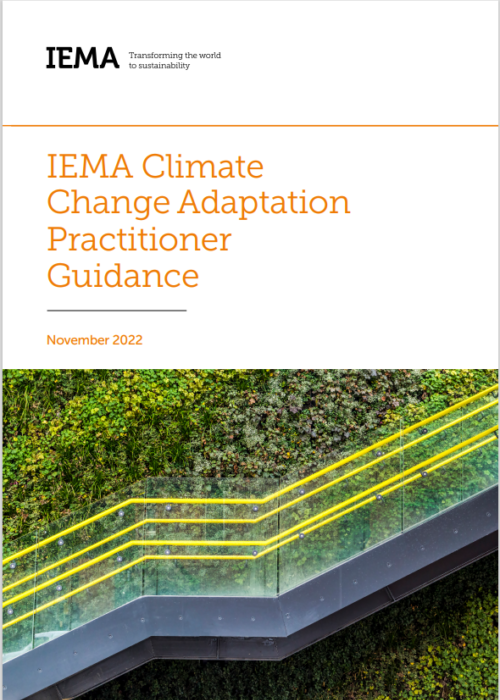At COP27, adaptation and the issue of compensation for climate impacts are high on the agenda. November 12th is the COP27 Adaptation and Agriculture Day and whilst many of the leaders attending have already highlighted the climate impacts they are already experiencing, it will bring home the heavy-hitting message that climate change is already here, and therefore that adaptation to climate change is now unavoidable. This guidance provides an essential toolkit for IEMA members to take action.
The guidance opens with key messages about the business case for adaptation, which will be of benefit for IEMA members who might be struggling to move the issue up the corporate agenda in their organisations. It also provides an overview of the different components of climate risk, and the complexity of their interactions with one another, highlighting why climate risk can translate to a critical business continuity risk.
Having convinced readers of the urgency for action, on the practical side the guidance sets out ways in which organisations can take action to adapt. Rather than producing a step-by-step guide, of the sort easily available elsewhere, this guidance sets out a more sophisticated maturity matrix; outlining the characteristics of an organisations which has a maturing adaptation approach, and is making progress on multiple fronts.
The authors recognise that in addressing adaptation, different organisations will take different approaches, and have different starting points. Some will work across different areas of the organisation at the same pace, and others will choose to focus on working at depth on specific areas. Some may be exposed to certain climate impacts, whilst others may have particular vulnerabilities. It is up to the organisation to decide where to dive into the matrix and when, and the choices made will depend upon the specific context and will be unique to each organisation.
The matrix breaks down the different business functions into sites and operations, people and skills, finance and resources, and supply and value chains. For each function, tangible adaptive actions described as initial, intermediate, and advanced are recommended for implementation. To illustrate and bring to life these actions, the guide includes case studies, as well as further reading.
Business as usual is no longer possible, and adaptative shifts in organisations’ functions are now an inescapable reality. This toolkit is an essential resource to support an organisation throughout its adaptation journey.

- If you are not an IEMA member but would like to access this publication, please complete the short form here to download the guide.
- If you are an IEMA member, please click here to log in and download the guide.
Subscribe
Subscribe to IEMA's newsletters to receive timely articles, expert opinions, event announcements, and much more, directly in your inbox.
Posted on 11th November 2022
Written by Chloë Fiddy
Latest Posts
-
IA Outlook Journal Volume 21: Impact Assessment Frontiers Part 2: People, Health and Equality
- 22nd July 2024 -
IEMA responds to Carbon Border Adjustment Mechanism (CBAM) consultation - July 2024
- 19th July 2024 -
The detail and policy action required beyond the King’s Speech
- 19th July 2024 -
Energy and Housing Bills included in the King’s Speech
- 17th July 2024 -
Launch of new resource for conservation technology tools
- 11th July 2024 -
Natural Capital 101: Guide for Sustainability Professionals
- 9th July 2024